Mental Health 360: ‘It’s really scary to be in a psych ward’
Four young Australians reveal how mental health issues have affected their lives and how the system needs to change.
Health
Don't miss out on the headlines from Health. Followed categories will be added to My News.
Chris Curran’s teenage sister was put on a waiting list for months to see a psychologist about her depression.
“She couldn’t get in to see a psychologist, there was so much waiting,’’ he recalls.
“Then when she finally got an appointment the psychologist was sick.’’
A week after that missed meeting, Jane Curran tragically died of suicide.
She had just finished Year 12, and was barely 17 years old.
Four years later, her big brother is campaigning for improvements to a mental health system that sees too many lives lost to suicide.
News Corp Australia this week launched Mental Health 360, bringing together mental health experts and those touched by it first-hand.
Panel experts include former Australian of the Year Professor Patrick McGorry, Sydney University’s Professor Ian Hickie, child psychiatrist Professor Jon Jureidini, Chris Turton who lost his son Dan to suicide, Kids Helpline CEO Tracy Adams and country music star and Rural Advisory Mental Health Program ambassador Melinda Schneider.
Together with senior journalists Sue Dunlevy, Ben Pike, Natasha Bita and Kathy McCabe, Mental Health 360 dissect what is arguably the biggest issue impacting Australians.
We spoke to four young Australians, who volunteer as advisers to Kids Helpline, about the causes of mental health problems, and the best ways to help.

‘DRINK A BUCKET OF CEMENT AND HARDEN UP’
Chris worries that suicide is still a “taboo topic’’, and advises parents, teachers and friends to stay calm and communicative when children try to talk about their troubles.
“We need to try to change the way we react … there is still a stigma, and we need to turn it from an awkward conversation to a warm, open conversation,’’ he says.
“When young people try to reach out for help you need to listen, be open, let them speak, acknowledge and thank them for providing that information.’’
George Thurston, 21, has known boys who deliberately injured themselves to get a break from competitive sport.
“In sports clubs they sometimes bully the players to make them tougher and work harder, and that also applies a lot of pressure,’’ he says.
“Boys injure themselves on purpose because they get wrapped up in sport and the only way to stop is to break an arm so they can take a month off.
“I spent my life playing sport but there is nothing in any sporting club about mental health.
“Even at school there was no clear pathway to go – a lot of people stop after one or two steps and don’t reach out for the help they need in time.’’
George warns that teenage boys and young men can find it hard to talk about their feelings.
“All they’re told is, ‘Build a bridge and get over it’, or ‘Drink a bucket of cement and harden up’ so that is ingrained in young men,’’ he says.
“If you’re told that by people you trust, immediately you think what you’re doing is wrong and you stop looking for help.
“It should be normalised to go and get help.’’
THE PEOPLE WHO NEED THE SERVICES AREN’T GETTING THEM
Fern Garvey, 22, who was left with a disability after a car accident four years ago, is gender diverse and has been diagnosed with a personality disorder.
Psychiatric visits cost $340 a session, and although Medicare covers some of the cost, Fern fears that many young Australians can’t afford the gap fee.
“There are long waiting lists, and so many people I know can’t afford therapy and then struggle and get to the point of suicide,’’ Fern says.
“You can’t go see a psychiatrist without having a lot of money.
“A lot of people I know are poor at uni and they can’t afford it, and they’re the ones who need help.
“The people who need the services aren’t getting them.’’
Fern said that young people with mental health issues need early treatment.
“You shouldn’t have to end up in hospital to be taken seriously,’’ Fern says.
“We need to make it safer and easier for people to talk.’’
IT’S REALLY SCARY TO BE IN A PSYCHIATRIC WARD
Tianna Stevens, 21, was severely bullied from the time she started school, and attempted suicide at 15.
“I was getting pushed around, getting my head bashed into bubblers, but my parents didn’t believe me – they said everyone gets bullied,’’ she recalls.
“I’d come home and cry myself to sleep every night.
“It took 10 years of school for people to take it seriously – it was when I ended up in hospital after I tried to take my life that they took it seriously.’’
Tianna’s mother then studied a Diploma of Counselling to help her daughter through her crisis.

Tianna wants governments to set up special psychiatric wards for teenagers and young adults, as it is “scary’’ for teens to be turned away from paediatric wards and sent to adult mental health units.
“It’s really scary to be in a psychiatric ward, it’s the most terrible, traumatic, lonely experience you could have,’’ she says.
Now studying a Bachelor of Arts, Tianna is on the Dean’s list for academic excellence at the University of Queensland, yet struggles with the isolation of learning online during the COVID-19 pandemic.
“When you have anxiety you do catastrophise,’’ she explains.
“You start to doubt your entire future, worry about university, employment, money, Centrelink, the future, the idea that you’re not valued in society, are you going to be homeless?
“You bully yourself, you doubt everything.’’
Tianna says parents tend to “blame themselves’’ for a child’s mental health issues, but need to keep encouraging their kids.
“Parents try to ‘fix it’, but just tell me you love me and will be there for me,’’ she says.
“Don’t stop believing your kid can still be happy and live a normal life and achieve things.
“The moment a parent or teacher stops believing in you, you stop believing in yourself.
“We just need one person to say, ‘I have faith in you’.’’
If you need help, see your GP or contact Kids Helpline by phone or online
Kidshelpline.com.au
1800 55 1800
For advice on anxiety and depression
https://kidshelpline.com.au/depression
https://kidshelpline.com.au/anxiety
In an emergency call 000
Originally published as Mental Health 360: ‘It’s really scary to be in a psych ward’



